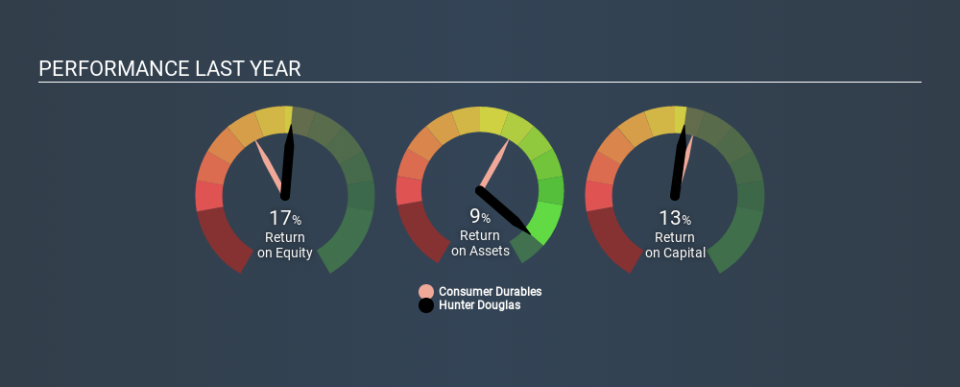Hunter Douglas N.V. (AMS:HDG) Earns Among The Best Returns In Its Industry

Today we'll look at Hunter Douglas N.V. (AMS:HDG) and reflect on its potential as an investment. Specifically, we're going to calculate its Return On Capital Employed (ROCE), in the hopes of getting some insight into the business.
First of all, we'll work out how to calculate ROCE. Then we'll compare its ROCE to similar companies. And finally, we'll look at how its current liabilities are impacting its ROCE.
What is Return On Capital Employed (ROCE)?
ROCE is a metric for evaluating how much pre-tax income (in percentage terms) a company earns on the capital invested in its business. Generally speaking a higher ROCE is better. Ultimately, it is a useful but imperfect metric. Author Edwin Whiting says to be careful when comparing the ROCE of different businesses, since 'No two businesses are exactly alike.
So, How Do We Calculate ROCE?
Analysts use this formula to calculate return on capital employed:
Return on Capital Employed = Earnings Before Interest and Tax (EBIT) ÷ (Total Assets - Current Liabilities)
Or for Hunter Douglas:
0.13 = US$343m ÷ (US$3.4b - US$707m) (Based on the trailing twelve months to March 2020.)
So, Hunter Douglas has an ROCE of 13%.
See our latest analysis for Hunter Douglas
Does Hunter Douglas Have A Good ROCE?
ROCE can be useful when making comparisons, such as between similar companies. Using our data, we find that Hunter Douglas's ROCE is meaningfully better than the 10% average in the Consumer Durables industry. I think that's good to see, since it implies the company is better than other companies at making the most of its capital. Independently of how Hunter Douglas compares to its industry, its ROCE in absolute terms appears decent, and the company may be worthy of closer investigation.
The image below shows how Hunter Douglas's ROCE compares to its industry, and you can click it to see more detail on its past growth.
When considering ROCE, bear in mind that it reflects the past and does not necessarily predict the future. ROCE can be deceptive for cyclical businesses, as returns can look incredible in boom times, and terribly low in downturns. ROCE is, after all, simply a snap shot of a single year. You can check if Hunter Douglas has cyclical profits by looking at this free graph of past earnings, revenue and cash flow.
What Are Current Liabilities, And How Do They Affect Hunter Douglas's ROCE?
Liabilities, such as supplier bills and bank overdrafts, are referred to as current liabilities if they need to be paid within 12 months. Due to the way ROCE is calculated, a high level of current liabilities makes a company look as though it has less capital employed, and thus can (sometimes unfairly) boost the ROCE. To check the impact of this, we calculate if a company has high current liabilities relative to its total assets.
Hunter Douglas has current liabilities of US$707m and total assets of US$3.4b. Therefore its current liabilities are equivalent to approximately 21% of its total assets. Current liabilities are minimal, limiting the impact on ROCE.
Our Take On Hunter Douglas's ROCE
Overall, Hunter Douglas has a decent ROCE and could be worthy of further research. Hunter Douglas looks strong on this analysis, but there are plenty of other companies that could be a good opportunity . Here is a free list of companies growing earnings rapidly.
If you like to buy stocks alongside management, then you might just love this free list of companies. (Hint: insiders have been buying them).
Love or hate this article? Concerned about the content? Get in touch with us directly. Alternatively, email editorial-team@simplywallst.com.
This article by Simply Wall St is general in nature. It does not constitute a recommendation to buy or sell any stock, and does not take account of your objectives, or your financial situation. We aim to bring you long-term focused analysis driven by fundamental data. Note that our analysis may not factor in the latest price-sensitive company announcements or qualitative material. Simply Wall St has no position in any stocks mentioned. Thank you for reading.

 Yahoo Finance
Yahoo Finance 
